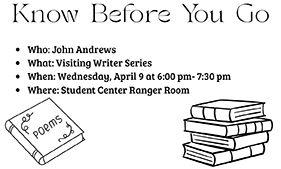By JESSICA SCHIEBER
News Editor

The Visiting Writer series has been going on for over 10 years.
The English, foreign language, and humanities department has been in contact with writers who have had links to Oklahoma to visit the campus and discuss their work with the community.
Each year the department tries to chose someone who writes fiction or poetry. Last year they had a fiction writer visit so this year the decision was to chose a poet.
The poet, John Andrews, was chosen because he had a connection with Oklahoma.
“He’s familiar with the experience of living in Oklahoma and being in Oklahoma and that’s an important part of the series, so that the folks who do come and talk here to capture something essential and what it means to be an Oklahoman,” said Dr. David Vaughan, assistant professor of English. “And so just I guess in the literal sense, that worked out nicely. But about his work, the thing which I think resonates with the, you know, the visiting writer series and the idea of the Oklahoma is that he writes about um sort of coming of age in the south. So, in some senses his poetry captures what it means to grow up in a place like this.”
Dr. Vaughan suggests reading through these pieces that John Andrews has wrote. “Colin Is Changing His Name” which is a poem about the way that names and what people call us seem to have some sort of control over our identity.
“Past Lives” which is about selfies and exploring what it means to be a person creating a fictional version of yourself.
“The book of Colin” which is recasting excitement more and in revelation.
“Students should come because, you know, his poetry is specifically about kind of defining who you are, and I think a lot of the college experiences kind of about figuring that out,” Vaughan said. “That sometimes it’s nice to hear an artist kind of distilled that nebulous experience and there is something concrete and tangible and poems and images of the thoughts.
And sometimes it allows this kind of black shawl to an idea that helps us navigate the perplexities of coming o terms of oneself as a young person. I think there might be ideas or images that really resonate with the student population, especially since, you know, he’s really bowed into things like social media and the difficulties of what it means to grow up in places like the south. I think students would enjoy that. We fund these kinds of events to bring in multiple voices and viewpoints so that students can learn from not just their professors but from other thinkers and writers who have things to say in addition to what you learned in the classroom.”
Any person is welcomed to come and join this event.
